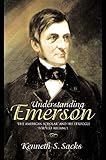Understanding Emerson : "The American Scholar" and His Struggle for Self-Reliance / Kenneth S. Sacks.
Material type: TextPublisher: Princeton, NJ : Princeton University Press, [2022]Copyright date: ©2003Description: 1 online resource (213 p.) : 17 halftonesContent type:
TextPublisher: Princeton, NJ : Princeton University Press, [2022]Copyright date: ©2003Description: 1 online resource (213 p.) : 17 halftonesContent type: - 9780691223681
- Learning and scholarship in literature
- Self-confidence
- Self-reliance
- LITERARY CRITICISM / American / General
- Alcott, Bronson
- Boston Quarterly Review
- Brook Farm
- Burke, Edmund
- Calvinism
- Carlyle, Jane
- Christian Examiner
- Common Sense philosophy
- Congregationalism
- Dwight, Timothy
- Everett, Alexander
- Freemasonry
- Friends of Progress
- Fuller, Margaret
- Graham, Sylvester
- Great Awakenings
- Harvard College
- Kant, Immanuel
- North American Review
- Parkman, Francis
- Perkins, Ephraim
- Pierce, John
- Princeton Theological Seminary
- Ticknor, George
- Trinitarian theology
- abolitionism
- antinomianism
- charity
- culture
- democracy
- double consciousness
- empiricism
- experience
- free speech
- gnosticism
- history as biography
- idealism
- institutions
- jeremiads
- languages, modern
- lyceum movement
- materialism
- miracles controversy
- moral philosophy
- natural law
- nature
- pragmatists
- realism
- revivalism
- scientific rationalism
- self-reliance
- temperance reform
- 814/.3 21
- PS1615.A84
- PS1615.A84 S23 2003
- online - DeGruyter
| Item type | Current library | Call number | URL | Status | Notes | Barcode | |
|---|---|---|---|---|---|---|---|
 eBook
eBook
|
Biblioteca "Angelicum" Pont. Univ. S.Tommaso d'Aquino Nuvola online | online - DeGruyter (Browse shelf(Opens below)) | Online access | Not for loan (Accesso limitato) | Accesso per gli utenti autorizzati / Access for authorized users | (dgr)9780691223681 |
Frontmatter -- CONTENTS -- LIST OF ILLUSTRATIONS -- PREFACE -- Introduction -- Chapter One “THE AMERICAN SCHOLAR” -- Chapter Two AMERICA IN “THE AMERICAN SCHOLAR” -- Chapter Three THE SCHOLAR TRANSFORMED -- Chapter Four SELF-RELIANCE -- Chapter Five FRIENDS -- Chapter Six ALCOTT -- Chapter Seven FOREVER THE AMERICAN SCHOLAR -- Appendix TEXT OF “THE AMERICAN SCHOLAR” -- ABBREVIATIONS USED IN THE NOTES -- NOTES -- BIBLIOGRAPHY -- INDEX
restricted access online access with authorization star
http://purl.org/coar/access_right/c_16ec
A seminal figure in American literature and philosophy, Ralph Waldo Emerson is considered the apostle of self-reliance, fully alive within his ideas and disarmingly confident about his innermost thoughts. Yet the circumstances around "The American Scholar" oration--his first great public address and the most celebrated talk in American academic history--suggest a different Emerson. In Understanding Emerson, Kenneth Sacks draws on a wealth of contemporary correspondence and diaries, much of it previously unexamined, to reveal a young intellectual struggling to define himself and his principles. Caught up in the fierce dispute between his Transcendentalist colleagues and Harvard, the secular bastion of Boston Unitarianism and the very institution he was invited to honor with the annual Phi Beta Kappa address, Emerson agonized over compromising his sense of self-reliance while simultaneously desiring to meet the expectations of his friends. Putting aside self-doubts and a resistance to controversy, in the end he produced an oration of extraordinary power and authentic vision that propelled him to greater awareness of social justice, set the standard for the role of the intellectual in America, and continues to point the way toward educational reform. In placing this singular event within its social and philosophical context, Sacks opens a window into America's nineteenth-century intellectual landscape as well as documenting the evolution of Emerson's idealism. Engagingly written, this book, which includes the complete text of "The American Scholar," allows us to appreciate fully Emerson's brilliant rebuke of the academy and his insistence that the most important truths derive not from books and observation but from intuition within each of us. Rising defiantly before friend and foe, Emerson triumphed over his hesitations, redirecting American thought and pedagogy and creating a personal tale of quiet heroism.
Mode of access: Internet via World Wide Web.
In English.
Description based on online resource; title from PDF title page (publisher's Web site, viewed 29. Jul 2022)


